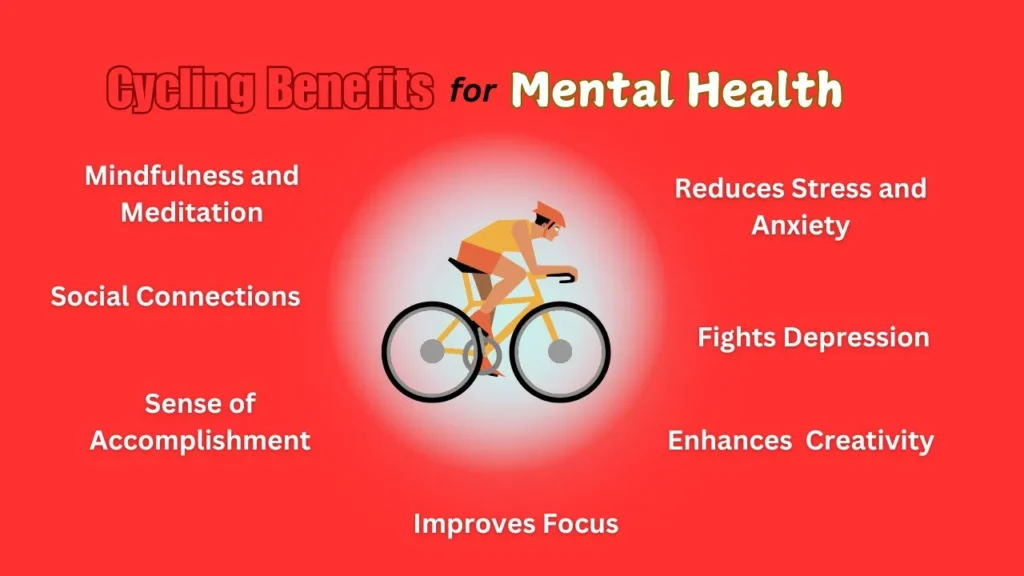Cycling Benefits for Mental Health: How Riding a Bike Boosts Your Mind

Discover the powerful mental health benefits of cycling, from reducing stress and anxiety to boosting mood and cognitive function. Learn how regular bike rides can enhance your overall well-being.

Cycling is often celebrated for its physical health benefits, from improving cardiovascular health to building muscle strength. However, what many people don’t realize is that cycling has a profound impact on mental health as well. Whether you’re taking a leisurely ride through the park or pushing yourself on a challenging uphill route, the mental health benefits of cycling are significant.
In this detailed guide, we’ll explore how cycling can improve your mental well-being and provide tips on how to get the most out of your rides to boost your mood, reduce stress, and enhance overall mental health.
1. Cycling Reduces Stress and Anxiety
One of the immediate benefits of cycling is its ability to reduce stress and anxiety. When you ride a bike, your body releases endorphins, which are natural mood lifters. The rhythmic pedaling, fresh air, and focus required to ride can help clear your mind, taking your focus away from stressful situations or anxious thoughts.
How It Works:
- Exercise-induced endorphins: Physical activity triggers the release of endorphins, often referred to as the “feel-good” hormones. These chemicals help alleviate feelings of stress and anxiety, leaving you with a sense of calm and relaxation.
- Exposure to nature: If you cycle outdoors, being in natural surroundings can further reduce stress. Research shows that spending time in nature reduces cortisol levels (the stress hormone), promoting a more peaceful state of mind.
Pro Tip:
When you’re feeling overwhelmed or anxious, a quick 20-30 minute bike ride around your neighborhood or in a park can do wonders for your mental clarity.
2. Boosts Mood and Fights Depression
Cycling can act as a powerful tool to combat depression and elevate mood. Regular physical activity like cycling promotes the production of neurotransmitters such as dopamine and serotonin, which play a vital role in regulating mood.
How It Works:
- Serotonin boost: Cycling helps increase serotonin levels in the brain. This neurotransmitter is key to maintaining mood balance, and low levels of serotonin are often linked to depression.
- Improved sleep: Exercise has been shown to improve sleep quality, which is critical for mental health. Good sleep helps regulate mood and prevent the onset of depressive symptoms.
Pro Tip:
If you’re struggling with low energy or mood, aim to include cycling in your weekly routine. Even short, gentle rides can help alleviate depressive symptoms over time.
3. Enhances Cognitive Function and Creativity
Cycling doesn’t just benefit your emotional well-being—it also boosts brain power. Studies have shown that aerobic exercises like cycling improve cognitive functions, including memory, focus, and problem-solving skills. Additionally, cycling promotes creativity by giving your mind the space to wander while you ride.
How It Works:
- Increased blood flow to the brain: Cycling increases blood flow and oxygen to the brain, which enhances mental sharpness and cognitive abilities. This can help improve memory, decision-making, and even delay the onset of age-related cognitive decline.
- Mental relaxation: The repetitive motion of pedaling, combined with the calming environment of an outdoor ride, allows your mind to relax. This mental space often leads to creative breakthroughs and clearer thinking.
Pro Tip:
If you’re working on a problem or need a creative spark, take a bike ride. The change of scenery and rhythmic movement can help you think more clearly and creatively.
4. Cycling Improves Focus and Reduces ADHD Symptoms
Cycling requires a certain level of concentration and coordination, which can be especially beneficial for those with attention difficulties, such as ADHD (Attention Deficit Hyperactivity Disorder). Studies have shown that cycling and other forms of aerobic exercise help reduce impulsivity and hyperactivity while improving focus.
How It Works:
- Increased dopamine levels: Cycling helps increase dopamine, a neurotransmitter that plays a key role in attention and focus. For people with ADHD, this boost in dopamine can help improve concentration.
- Mind-body connection: The coordination required for cycling—balancing, steering, and pedaling—engages both the body and mind, improving focus and mindfulness.
Pro Tip:
If you or someone you know struggles with focus or hyperactivity, incorporating regular bike rides can help with concentration and reduce restlessness, especially for children and adolescents.

5. Cycling Fosters a Sense of Accomplishment
Setting and achieving cycling goals, whether it’s completing a certain distance, conquering a hill, or simply riding for a set amount of time, provides a sense of accomplishment. These small wins help build confidence and self-esteem, key elements for maintaining good mental health.
How It Works:
- Goal-setting and achievement: When you set cycling goals and reach them, you experience a sense of achievement. This boosts your self-esteem and encourages positive feelings of self-worth.
- Progress tracking: Whether it’s improving your speed, stamina, or distance, tracking your cycling progress (using apps like Strava or Garmin) helps you visualize your achievements, providing motivation and satisfaction.
Pro Tip:
Set small, achievable cycling goals to boost your confidence. Whether you’re aiming to cycle for 30 minutes a day or tackle a specific route, celebrating these milestones can uplift your mood.
6. Encourages Social Connections
Cycling doesn’t have to be a solo activity. Riding with friends, joining a cycling club, or participating in group rides fosters a sense of community and social support, which is critical for mental well-being. Social interaction reduces feelings of isolation, which can help improve overall happiness and combat loneliness.
How It Works:
- Shared experiences: Joining a cycling group or riding with friends allows you to share experiences, which strengthens social bonds and creates positive social interactions.
- Support system: Socializing with other cyclists who share your passion creates a support system, encouraging you to stay active and connected.
Pro Tip:
Look for local cycling groups or events to meet like-minded people. The camaraderie and encouragement from others will not only enhance your riding experience but also contribute to better mental health.
7. Cycling Promotes Mindfulness and Meditation
Cycling, especially at a steady pace in quiet surroundings, can serve as a form of moving meditation. The rhythmic nature of pedaling, combined with the calming environment of nature, helps you stay in the moment, promoting mindfulness. This, in turn, reduces racing thoughts and promotes a state of mental peace.
How It Works:
- Rhythmic motion: The repetitive nature of cycling—pedal after pedal—can have a meditative effect, helping you focus on the present moment and quiet your mind.
- Breathing focus: Cycling requires controlled breathing, which can mimic the breathing patterns used in traditional meditation, helping to reduce anxiety and promote relaxation.
Pro Tip:
On your next ride, focus on your breathing, the sound of your tires, and the feeling of the wind on your face. This mindfulness practice can help you reduce stress and gain mental clarity.
8. Cycling Builds Resilience
Cycling, particularly long-distance rides or tackling difficult terrain, builds both physical and mental resilience. The endurance required to keep going during tough rides translates into mental toughness, which helps you face challenges off the bike with a stronger mindset.
How It Works:
- Overcoming challenges: When you push through a challenging ride, whether it’s a steep hill or a long-distance trek, you build mental resilience. This teaches you how to handle adversity and bounce back from setbacks.
- Mental toughness: Cycling fosters determination and persistence, qualities that help improve mental fortitude in other aspects of life.
Pro Tip:
Challenge yourself with new cycling goals, whether it’s completing a longer route or riding up a tough hill. Each accomplishment will not only build physical strength but also mental resilience.
Final Thoughts
Cycling offers far more than just physical fitness—it’s a powerful tool for improving mental health. From reducing stress and anxiety to boosting mood and enhancing cognitive function, regular cycling provides a holistic approach to mental well-being. Whether you’re riding solo for mindfulness or joining a group ride for social connection, the mental health benefits of cycling are profound and accessible to everyone.
So, the next time you’re feeling overwhelmed, stressed, or simply in need of a mental boost, hop on your bike and experience the mental health benefits firsthand!
Happy riding!
More From Lets Read News Cycling:






